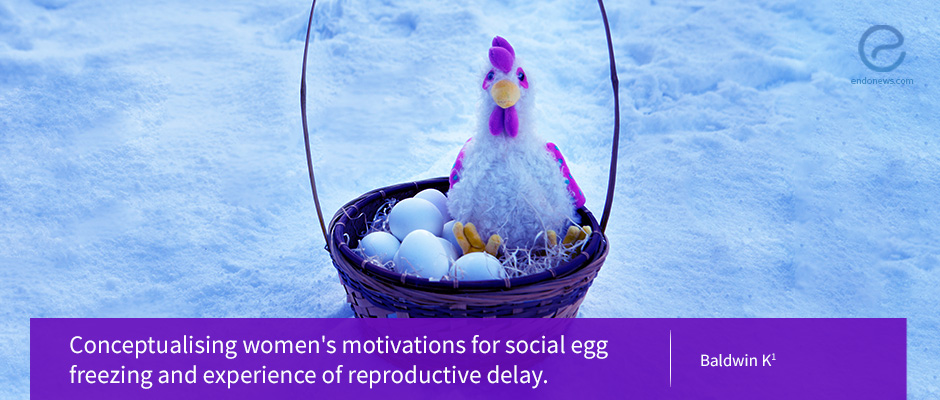Reproductive delay and social egg freezing
Apr 30, 2018
Why women are experiencing reproductive delay and motivated by social egg freezing?
Key Points
Highlight:
- The average motherhood in Western countries has risen over the past decades. At the same time, social egg freezing for fertility preservation is increasing. This article examined the factors motivating women to undergo social egg freezing.
Importance:
- Egg freezing is a fertility preservation strategy to enable women at risk of premature ovarian failure to retain future genetic motherhood which is important for endometriosis patients.
What's done here:
- Qualitative interview to explore factors motivating women to take up social egg freezing and reproductive delay.
- Thirty-one interviews were undertaken for the study, with an average of an hour and 40 minutes in duration
Data:
Main factors influencing women to choose social egg freezing technology and reproductive delay include:
- Neoliberal rationality: Undergoing egg freezing rather than passive acceptance of declining fertility is a responsible way for the future.
- Heteronormativity and life course expectation: Women has expectations of ideal heteronormative life-course progression from marriage to motherhood.
- Discourses of ‘appropriate parenting’: women associate motherhood with accumulation of specific resources including having completed formal education and become established in a chosen career; a secure job and income; a home suitable for childrearing; a suitable partner who shared their desire for parenthood; and the experience of living as an independent, childfree adult.
- Ideologies of parenthood: many participants were emotionally ready for motherhood, but are preconditioned of thought regarding ideal parenthood and missing the presence of a committed partner.
Lay Summary
The data collected from Office for National Statistics in England and Wales has suggested a major shift in the timing of motherhood. In the mid-1970s, the average age of motherhood was 26.4 years of age to, while in 2016, it has increased to 30.4 years. Concurrently occurring with this shift to later motherhood is the development of assisted reproductive technologies such as in vitro fertilization, and technologies of egg donation and freezing. This article by Baldwin from Centre for Reproduction Research, De Montfort University, UK published in Sociology of Health & Illness journal focused on factors accounting for women to take up egg freezing technology.
Egg freezing is a fertility preservation strategy to enable women at risk of premature ovarian failure to retain the possibility of future motherhood. Following its development in the mid-2000s, the technology has been commercialized for healthy and most often single women to preserve their fertility. This is referred as ‘social’ egg freezing and is generally considered as a way for women to ‘delay’ motherhood.
Women choosing to freeze their egg will be administered with hormone drugs to stimulate ovaries to produce more eggs than a normal cycle. These eggs are then collected during sedation using a fine needle through cervix which aspirates individual egg follicles in the ovaries and frozen using vitrification.
A growing number of studies examining older mothers have suggested that ‘delayed’ childbearing is often not due to deliberate choice, but a result of various uncontrollable factors. These studies have identified a plethora of complex physical, economic, structural and relational factors shaping delayed motherhood.Physical or biological factors include health, fertility, disability status and also the risk of chromosomal abnormalities due to parents’ genetic profile.
On top of these more well-described factors, this study examined the motivations and experiences of women underwent social egg freezing through a qualitative exploration into women’s accounts of social egg freezing and reproductive delay. These accounts were recorded in the form of interviews with thirty-one interviews users of egg freezing technology lasting on average an hour and 40 minutes in duration.
The author found that the conceptual explanations for reproductive delay and use of social egg freezing are largely due to factors including neoliberal rationality (subscription to value of responsibility and fear of future regret); heteronormativity and lifecourse (participants desire to pursue motherhood with a male partner ideally married at the point of conception); discourses of ‘appropriate parenting’ (motherhood require accumulation of resources such as completion of formal education and career establishment); and ideologies of parenthood (participants were emotionally ready for motherhood, but are preconditioned to finding ‘ideal parenthood’ involving committed partner).
In conclusion, this study suggests that motivation to engage in egg freezing is shaped by complex factors and forces, most of which include the desire to live up to the ideals of a good reproductive citizen and mother. Increasingly, women are drawn to egg freezing as a tool to enable them to better align the right time biologically and socially for motherhood by preserving fertility.
Research Source: https://www.ncbi.nlm.nih.gov/pubmed/29602235
fertility egg freezing motherhood biobanks reproductive timing assisted reproductive technologies (ARTs) gender parenting/parents social egg freezing

